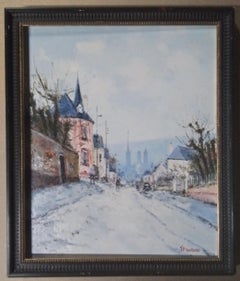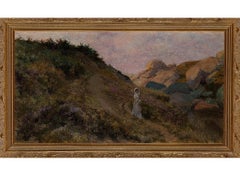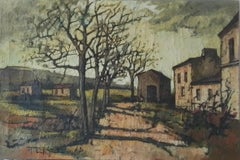Want more images or videos?
Request additional images or videos from the seller
1 of 24
Charles François Daubigny Les lavandières au milieu des vaches
$14,949.61List Price
About the Item
- Creator:Charles François Daubigny (1817 - 1878, French)
- Dimensions:Height: 15.08 in (38.3 cm)Width: 26.97 in (68.5 cm)
- Medium:
- Movement & Style:
- Period:
- Condition:Packing and Shipping to Continental USA and Worldwide included.
- Gallery Location:PARIS, FR
- Reference Number:1stDibs: LU2804216383002
About the Seller
5.0
Vetted Professional Seller
Every seller passes strict standards for authenticity and reliability
Established in 2024
1stDibs seller since 2024
10 sales on 1stDibs
Authenticity Guarantee
In the unlikely event there’s an issue with an item’s authenticity, contact us within 1 year for a full refund. DetailsMoney-Back Guarantee
If your item is not as described, is damaged in transit, or does not arrive, contact us within 7 days for a full refund. Details24-Hour Cancellation
You have a 24-hour grace period in which to reconsider your purchase, with no questions asked.Vetted Professional Sellers
Our world-class sellers must adhere to strict standards for service and quality, maintaining the integrity of our listings.Price-Match Guarantee
If you find that a seller listed the same item for a lower price elsewhere, we’ll match it.Trusted Global Delivery
Our best-in-class carrier network provides specialized shipping options worldwide, including custom delivery.You May Also Like
small oil landscape on cardboard "Village 2"
Located in Zofingen, AG
small landscape in oil on cardboard "Village 2" drawn by Natalya Shiporina. The painting is part of a series of 3 paintings.
Category
2010s Impressionist Landscape Drawings and Watercolors
Materials
Oil, Cardboard
Alexander Drysdale, Live Oak and Cypress Trees - Provenance - Framed
By Alexander Drysdale
Located in New Orleans, LA
A classic Alexander Drysdale bayou scene, with the characteristic orangey/peach Impressionistic glow, out of the estate of Kenneth Abshire of Gulfport, MS. If you clicked on this, yo...
Category
1910s Impressionist Landscape Drawings and Watercolors
Materials
Oil
$5,900
H 22.5 in W 32.5 in
Dam at Genetin - Impressionist Oil, Winter Riverscape by Armand Guillaumin
By Jean Baptiste-Armand Guillaumin
Located in Marlow, Buckinghamshire
Signed and dated impressionist landscape oil on canvas by French painter Jean Baptiste Armand Guillaumin. This simply stunning piece de...
Category
Early 1900s Impressionist Landscape Paintings
Materials
Canvas, Oil
Autumn Landscape. 1976. Oil on cardboard, 22x31 cm
By Edgars Vinters
Located in Riga, LV
Autumn Landscape. 1976. Oil on cardboard, 22x31 cm
Edgars Vinters (1919-2014)
Edgars Vinters is working in oil, watercolor and monotype techniques. He paints landscapes in different...
Category
1970s Impressionist Landscape Paintings
Materials
Oil, Cardboard
$458 Sale Price
20% Off
H 8.67 in W 12.21 in D 0.08 in
My unforgettable moments at the beach (seaside oil painting)
Located in VÉNISSIEUX, FR
This contemporary seaside artwork "My unforgettable moments at the beach" celebrates my love for the beach, sea, sand and summer vacations spent at the beach.
I explore the beauty o...
Category
2010s Impressionist Landscape Drawings and Watercolors
Materials
Paper, Oil
$502
Free Shipping
H 12.01 in W 9.06 in D 0.04 in
Hay stacks. 1981. Oil on cardboard, 22x30 cm
By Edgars Vinters
Located in Riga, LV
Hay stacks. 1981. Oil on cardboard, 22x30 cm
Category
1980s Impressionist Landscape Paintings
Materials
Oil, Cardboard
$459 Sale Price
20% Off
H 8.67 in W 11.82 in D 0.04 in
Landscape. 2007. Oil on cardboard, 22x30, 5 cm
By Edgars Vinters
Located in Riga, LV
Landscape. 2007. Oil on cardboard, 22x30,5 cm
Edgars Vinters (1919-2014)
Edgars Vinters is working in oil, watercolor and monotype techniques. He paints landscapes in different seas...
Category
Early 2000s Impressionist Landscape Paintings
Materials
Oil, Cardboard
$459 Sale Price
20% Off
H 17.33 in W 23.63 in D 0.08 in
River in winter. 1987, oil on board, 40x50 cm
By Edgars Vinters
Located in Riga, LV
River in winter. 1987, oil on board, 40x50 cm
Winter landscape by the river
Edgars Vinters (1919-2014)
Edgars Vinters is working in oil, watercolor and monotype techniques. He paint...
Category
1980s Impressionist Landscape Paintings
Materials
Oil, Cardboard
$1,148
H 15.75 in W 19.69 in D 0.08 in
Yachts. 2019, oil on canvas, 60x50 cm
Located in Riga, LV
Yachts. 2019, oil on canvas, 60x50 cm
Valery Bayda (1958)
Valery Bayda was born in 1958 in Russia. From 1983 to 1989 he studied at the All-Union State I...
Category
2010s Impressionist Landscape Paintings
Materials
Canvas, Oil
$1,674 Sale Price
25% Off
H 23.63 in W 19.69 in D 0.79 in
Old town. The embankment 2017, oil on canvas, 40x50 cm
Located in Riga, LV
Spruce in snow. 2010, cardboard, oil, 24x34 cm
Valery Bayda (1958)
Valery Bayda was born in 1958 in Russia. From 1983 to 1989 he studied at the All-Unio...
Category
2010s Impressionist Landscape Paintings
Materials
Oil, Canvas
$1,722 Sale Price
20% Off
H 15.75 in W 19.69 in D 0.79 in
More From This Seller
View AllVintage french Impressionism by Jean Dubord - oil signed
By Jean-Pierre Dubord
Located in PARIS, FR
Conditions : Excellent overall Conditions. The canvas is mounted on an antique style frame decorated with pearls. Signed lower right.
Free US CONTINENTAL shipping, incl Europe and A...
Category
Late 20th Century Impressionist Landscape Paintings
Materials
Oil
Vintage french oil by René Lelong- Lady on a path by the ocean
By René Lelong
Located in PARIS, FR
Conditions : Excellent overall Conditions. Oil on original canvas signed lower left.
Free US CONTINENTAL shipping, incl Europe and Asia.
René Lelong studied at the Académie Julian f...
Category
Late 19th Century Impressionist Landscape Paintings
Materials
Oil
Jean-Pierre DUBORD (1949) "French "Le quai à La Bouille en hiver" Oil on canvas
Located in PARIS, FR
Conditions : Jean-Pierre DUBORD (1949) "Le quai à La Bouille en hiver"- Oil on Canvas in very good overall Conditions. Signed lower left. Artist inscription on the back. Framed. F...
Category
Late 20th Century Impressionist Landscape Paintings
Materials
Oil
Vintage art - French cottage. Landscape with houses. O/C, signed
Located in PARIS, FR
Excellent overall condition. Analysis under UV light shows no retouching, and no prior restaurations. Original canvas.
Category
1960s Impressionist Landscape Paintings
Materials
Oil
Boat in Harbor - At a Normandy harbor - Galien laloue - oil on canvas -
By Eugene Galien-Laloue
Located in PARIS, FR
Conditions : Good overall Conditions. Oil on canvas. Highly detailed composition in a 19th century original frame. This painting will be included in Volume II of the catalog of the w...
Category
Late 19th Century Impressionist Landscape Paintings
Materials
Oil
ANTOINE CAMBOUR. The poppy field near Giverny, oil on canvas, signed lower left
Located in PARIS, FR
Claude Cambour: A Life of Light and Impressionism
Free US CONTINENTAL shipping, incl Europe and Asia.
Claude Cambour, born in Dreux, west of Paris, in ...
Category
20th Century Impressionist Landscape Paintings
Materials
Oil
Recently Viewed
View AllMore Ways To Browse
Find Dealer
Antique Model Boats
The Last Days Of Napoleon
Roman Ruins Painting
Russian School Oil
San Antonio Missions
Santa Cruz Boardwalk
Scottish School Oil Painting
Storm Cloud Painting
Tahoe Paintings
Vintage Horse Buggies
Walter James
Winter House Painting
Winter Night Painting
Yorkshire Dales
1881 Oil Paintings
Anna Ladecka
Arizona Desert Art



